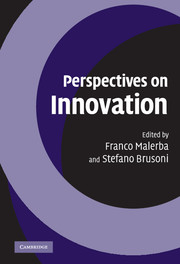Book contents
- Frontmatter
- Contents
- List of figures
- List of tables
- List of contributors
- Prefatory note
- Introduction
- Part 1 Innovation and economic growth
- Part 2 The microdynamics of the innovation process
- Part 3 Innovation and industrial dynamics
- 5 Statistical regularities in the evolution of industries: a guide through some evidence and challenges for the theory
- 6 Spin-off entry in high-tech industries: motives and consequences
- Comments to Chapters 5 and 6
- Part 4 Innovation and institutions
- Part 5 Innovation, firms' organization, and business strategies
- Part 6 Innovation and entrepreneurship
- Part 7 Innovation and evolution of the university system
- Part 8 Innovations and public policy
- Index
5 - Statistical regularities in the evolution of industries: a guide through some evidence and challenges for the theory
Published online by Cambridge University Press: 06 January 2010
- Frontmatter
- Contents
- List of figures
- List of tables
- List of contributors
- Prefatory note
- Introduction
- Part 1 Innovation and economic growth
- Part 2 The microdynamics of the innovation process
- Part 3 Innovation and industrial dynamics
- 5 Statistical regularities in the evolution of industries: a guide through some evidence and challenges for the theory
- 6 Spin-off entry in high-tech industries: motives and consequences
- Comments to Chapters 5 and 6
- Part 4 Innovation and institutions
- Part 5 Innovation, firms' organization, and business strategies
- Part 6 Innovation and entrepreneurship
- Part 7 Innovation and evolution of the university system
- Part 8 Innovations and public policy
- Index
Summary
Introduction
Fundamental drivers of the evolution of contemporary economies are the activities of search, discovery and economic exploitation of new products, new production processes and new organizational arrangements within and amongst business firms. Such processes ultimately entail the emergence and development of novel bodies of technological knowledge, novel ‘ways of doing things’ and novel organizational setups. Indeed the identification of the sources of change and the ‘political economy’ of their economic selection continues to be a major challenge for all analysts of socio-economic change. Knitted together, however, comes also the understanding of the statistical properties that such processes might possibly display. This work focuses on the latter, concerning specifically the patterns of industrial evolution. Three basic questions in particular are addressed here:
Are there distinct characteristics of the micro entities (in primis, business firms) and their distributions which systematically persist over time?
How do such characteristics within the population of competing firms affect their relative evolutionary success over time? And, in particular, what are the ultimate outcomes in terms of growth and profitability performances?
Amongst the foregoing statistical properties and relations between them, which ones are invariant across industries, and, conversely, which ones depend on the technological and market characteristics of particular sectors?
Information
- Type
- Chapter
- Information
- Perspectives on Innovation , pp. 153 - 186Publisher: Cambridge University PressPrint publication year: 2007
Accessibility standard: Unknown
Why this information is here
This section outlines the accessibility features of this content - including support for screen readers, full keyboard navigation and high-contrast display options. This may not be relevant for you.Accessibility Information
- 69
- Cited by
